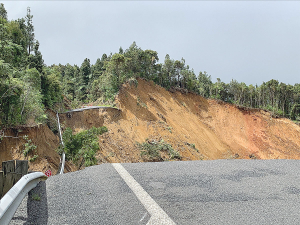Major shakeup for the NZ science system
The government has announced a major restructuring of the country's seven crown research institutes (CRIs), which will see them merged into three public research organisations (PROs).
 A section of damaged 25A highway after Cyclone Gabrielle hit parts of the North Island in February last year. Photo Credit: NZTA.
A section of damaged 25A highway after Cyclone Gabrielle hit parts of the North Island in February last year. Photo Credit: NZTA.
The El Nino weather pattern is likely to kick in during the last few weeks of February.
That’s the view of NZ Metservice meteorologist, James Millward, who told Dairy News that this will bring higher pressures across the North Island, resulting in prolonged dry summer weather.
He says the good news for farmers is that conditions will be more typical, unlike last year's weird wet weather.
Millward says at present the North Island is drying out and in terms of soil moisture the country is not far away from where it would normally be. He says the exception is southern Wairarapa which is particularly dry. But he adds that the expected early dry has not eventuated, with rain falling in Tairāwhiti and Hawke’s Bay and the possibility of further rains, depending on what might happen with weather systems in the tropics.
“The weather could be a bit of a mixed bag in the coming couple of weeks and then we are likely to see it transition into the normal El Nino pattern,” he says.
Millward says it’s been drying out in most dairy regions. He says while it’s dried out in Canterbury, this region has benefited from some of the rain that came over the ranges from the heavy downpours on the West Coast. He says some of this got into the McKenzie Basin which was very dry. Other dry areas are Kaikoura and Marlborough.
“Overall it’s a drier outlook for the South Island,” he says.
Millward says the weather patterns are on a much more even footing and that will give farmers more certainty as to where they are and where they are going. He says it looks like being a typical late summer and autumn, albeit with a slight bias to the more westerly aspect flow, which is more typical of the El Nino patterns that were promised. He says once these kick in, eastern parts of both islands should get drier than normal. Millward says there is a risk that droughts could set in though autumn.
“But at the moment we are sitting pretty well right across the country in terms of soil moistures, so for farmers it’s probably not so stressful as it has been,” he says.
Agrisea NZ has appointed Craig Hudson as it's new chief growth officer.
State farmer Landcorp, trading as Pamu, is a forecasting a full-year net profit of around $100 million.
Tony Aitken, chief executive of Ruralco, has been awarded the Excellence in Business Leadership Award at the ANZ Business of the Year Awards.
Global trade has been thrown into another bout of uncertainty following the overnight ruling by US Supreme Court, striking down President Donald Trump's decision to impose additional tariffs on trading partners.
Controls on the movement of fruit and vegetables in the Auckland suburb of Mt Roskill have been lifted.
Fonterra farmer shareholders and unit holders are in line for another payment in April.
OPINION: Staying with politics, with less than nine months to go before the general elections, there’s confusion in the Labour…
OPINION: Winston Peters' tirade against the free trade deal stitched with India may not be all political posturing by the…